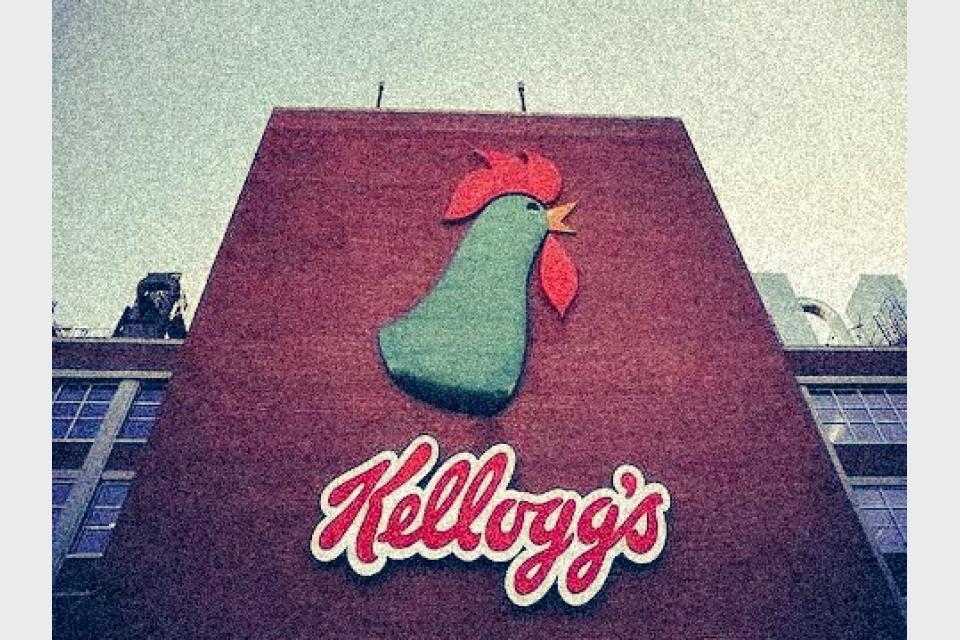Kellogg stock was rising on Tuesday after the cereal and snack giant announced plans to split into three independent companies. Its chief financial officer tells Barron’s that the company is “super excited” to be announcing this next logical step in the “transformation of our portfolio that’s been ongoing for a decade.”
Kellogg (ticker: K) will spin off its U.S., Canadian, and Caribbean cereal and plant-based businesses. The names of the companies will be determined later.
The first, “Global Snacking Co.,” will encompass Kellogg’s global snacking, international cereal and noodles, and North American frozen breakfast operations. Kellogg estimates this company will have about $11.4 billion in net sales from brands including Pringles, Cheez-it, and Nutri-Grain, among others. Chief Executive Officer Steve Cahillane will remain CEO of the company.
“North America Cereal Co.,” with about $2.4 billion in net sales, will focus on the U.S., Canada, and the Caribbean. In the short term, the company will work on restoring inventory and profit margins after a series of supply disruptions in 2021, Kellogg said. The company will announce proposed management at a later date.
“Plant Co.” will be a pure-play plant-based foods company with business primarily in North America, with an eye to international expansion. It will have about $340 million in net sales, driven by the MorningStar Farms brand.
“These businesses all have significant standalone potential, and an enhanced focus will enable them to better direct their resources toward their distinct strategic priorities,” Cahillane said. “In turn, each business is expected to create more value for all stakeholders, and each is well-positioned to build a new era of innovation and growth.”
The spinoffs are all tax-free transactions. Kellogg shareholders would receive shares in the two spinoff entities relative to their holdings at the date of each spinoff. The company expects North America Cereal Co. to be spun off before Plant Co., with both transactions targeted to be completed by the end of 2023.
Over the last year, spinoffs have been a popular way for companies to unlock value for investors because they theoretically allow the pieces of a corporation to trade at higher valuations than they would if trapped inside the company. But spinoffs are rarely straightforward: It can take years to execute such deals, and even longer for the spun off company to start making significant returns.
CFO Amit Banati spoke with Barron’s on Wednesday about the move, saying he is certain that now is the time for the spinoffs, which he said will create value for all stakeholders.
The separation will allow each of the new businesses to “reach their potential and focus on their strategic priorities with financial targets that best fit their opportunities,” he said.
Banati says the snacking business is filled with well known brands with strong momentum that are well positioned to keep growing. The cereal business is more mature, but still has “compelling opportunities for investment, as well as driving profit going forward.” That includes recovering from a factory fire and strikes that hurt margins for cereal in 2021, as Kellogg looks to invest in supply chains and improved capabilities.
Meanwhile the plant-based protein company, led by industry pioneer Morningstar Farms, is in “an incredibly exciting space with structured tailwinds, and will have the freedom to go after that growth, in the U.S. and internationally,” he said.
Investors may be concerned about the loss of synergies as a result of breaking up the company, given that the market has been so laser focused on supply chain and transit costs. But Banati says that the company has proven adept at navigating these situations—see its divestiture of cookie brands like Keebler in 2019—and that all three businesses already have their own impressive scale.
He also highlighted the fact that Kellogg has already been dealing with supply-chain “twists and turns” for over two years now, a factor that he said makes him highly confident about the breakup process. The companies could also make use of transitional service agreements in areas like IT and distribution, where Kellogg only slowly unwinds their shared use of resources.
For Stifel analyst Christopher Growe, the news is a positive for the stock.
“We see strong underlying conditions in Kellogg’s business outside of U.S. cereal, and particularly for snacks, with strong retail sales trends for many of its top brands, pricing continuing to move up to offset input cost inflation, and robust emerging market growth,” he wrote in a research note on Tuesday.
Shares of Kellogg were up 2.6% to $69.38. The stock has outperformed the market this year, gaining 9%.









